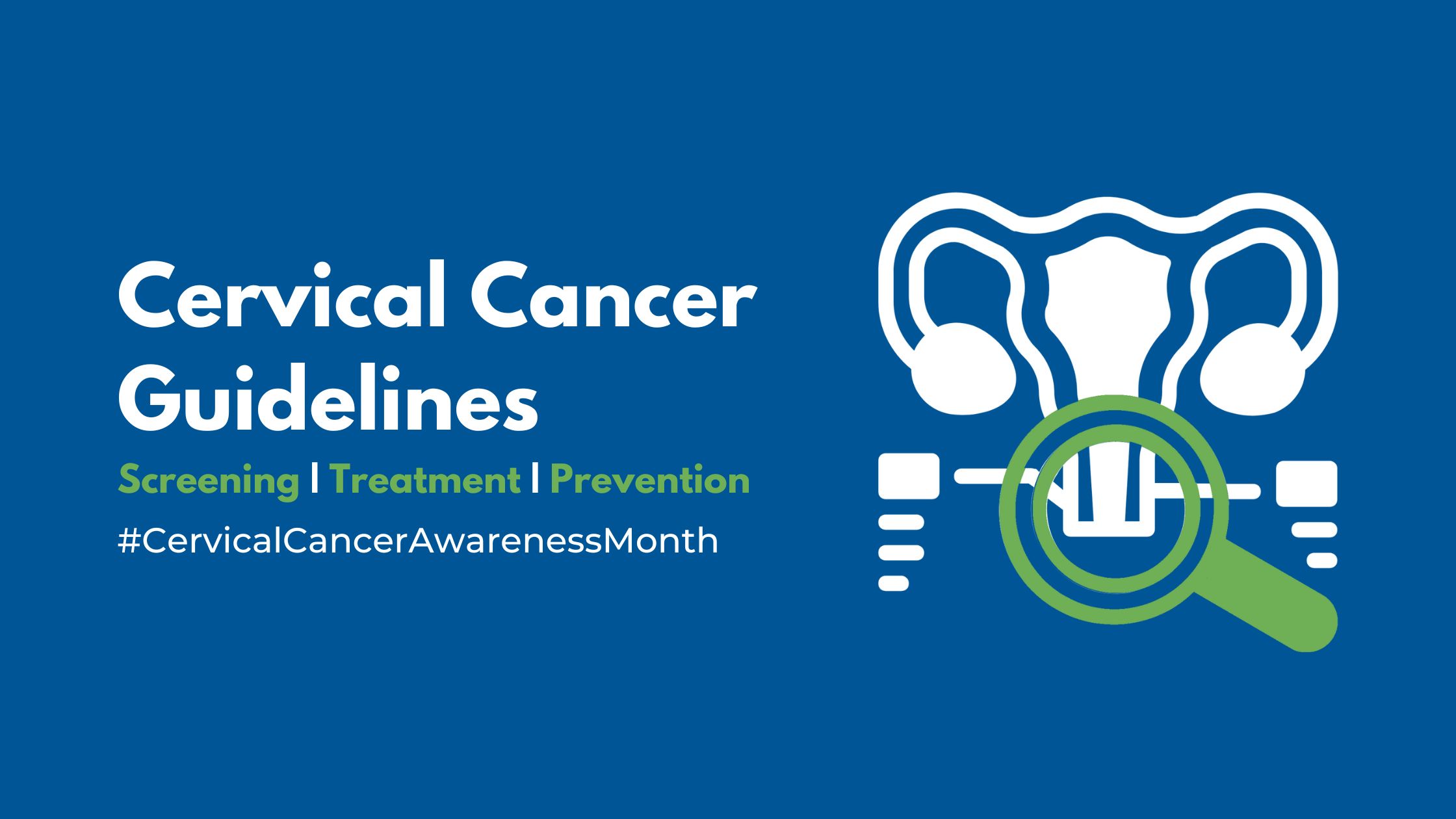Cervical Cancer Guidelines for Cervical Cancer Awareness Month 2023

Even though it is preventable, more than 15,000 women in the United States alone are diagnosed each year with cervical cancer, a potentially fatal condition that can be caused by infections with pathogens – bacteria, viruses, and parasites.
January is World Cervical Cancer and Cervical Health Awareness Month – a dedicated month with a special focus and emphasis on helping to prevent the disease with appropriate vaccinations and improve outcomes for those diagnosed with cervical cancer by educating them about the importance of early detection.
This post will cover a list of some of the most important guidelines, mainly from guidelines-authoring organizations within the United States, to help spread the message of cervical health and cervical cancer prevention, early detection, and treatment.
Cervical Cancer Screening Guidelines
- Cervical Cancer Screening for Individuals at Average Risk
- Society: American College of Surgeons (ACS)
- Published Date: July 2020
- Management of Abnormal Cervical Cancer Screening Test Results and Cervical Cancer Precursors
- Society: American College of Obstetricians and Gynecologists (ACOG)
- Published Date: December 2013
- Cervical Cancer Screening in Average-Risk Women
- Society: American College of Physicians (ACP)
- Published Date: June 2015
- Abnormal Cervical Cancer Screening Tests and Cancer Precursors
- Society: American Society for Colposcopy and Cervical Pathology (ASCCP)
- Published Date: April 2020
- Cervical Cancer: Screening – Women aged 21 to 65 years
- Society: U.S. Preventive Services Task Force (USPSTF)
- Published Date: August 2018
- Cervical Cancer: Screening – Women older than 65 years
- Society: U.S. Preventive Services Task Force (USPSTF)
- Published Date: August 2018
- Cervical Cancer: Screening – Women younger than 21 years
- Society: U.S. Preventive Services Task Force (USPSTF)
- Published Date: August 2018
- Cervical Cancer: Screening – Women who have had a hysterectomy
- Society: U.S. Preventive Services Task Force (USPSTF)
- Published Date: August 2018
- Screening and Treatment of Cervical Pre-cancer Lesions for Cervical Cancer Prevention
- Society: World Health Organization (WHO)
- Published Date: July 2021
Cervical Cancer Treatment Guidelines
- Management and Care of Women With Invasive Cervical Cancer
- Society: American Society of Clinical Oncology (ASCO)
- Published Date: February 2022
- Cervical Cancer Login Required
- Society: National Comprehensive Cancer Network (NCCN)
- Published Date: December 2022
- Brachytherapy – Primary Radiation Therapy for Cervical Cancer
- Society: Society of Gynecologic Oncology (SGO)
- Published Date: March 2019
- Radiation Therapy for Cervical Cancer
- Society: American Society for Radiation Oncology (ASTRO)
- Published Date: June 2020
Cervical Cancer Prevention Guidelines
- Secondary Prevention of Cervical Cancer
- Society: American Society of Clinical Oncology (ASCO)
- Published Date: September 2022
- Primary Prevention of Cervical Cancer
- Society: American Society of Clinical Oncology (ASCO)
- Published Date: May 2017
- Recommended Childhood and Adolescent Immunization Schedule: United States, 2022
- Society: Centers for Disease Control and Prevention (CDC)
- Published Date: February 2022
- Recommended Adult Immunization Schedule: United States, 2022
- Society: Centers for Disease Control and Prevention (CDC)
- Published Date: February 2022
A Few Takeaways To Remember
- HPV vaccination is safe and effective. CDC recommends HPV vaccination at age 11 or 12 years (or can start at age 9 years) and for everyone through age 26 years, if not vaccinated already. For teens and young adults (15 – 26 years), who are not vaccinated, CDC recommends three doses of the vaccine. Three doses are also recommended for: people with weakened immune systems aged 9 through 26 years and some adults between the ages of 27 and 45 years, who are not already vaccinated, may decide to get the HPV vaccine after consulting with their medical provider about their risk for new HPV infections.
- Routine cancer screenings help prevent cervical cancer. The United States Preventive Services Task Force and the World Health Organization both recommend that women receive appropriate cervical cancer screenings. These screenings help to identify precancers that may lead to cervical cancer. In the United States, women aged 21– 65 years, who receive regular cervical cancer screenings, are less likely to get cervical cancer and less likely to die from it. Women aged 21-29 years should receive a Pap Test to screen for cervical cancer. Women aged 30-65 years have three available options for cervical cancer screening: Pap testing alone, HPV testing alone, and HPV and Pap testing together. Women who are 65 years old or older should consult their healthcare provider about whether they need to continue cervical cancer screening.
Cervical cancer was once the most fatal cancer diagnosis for women in the United States and with today’s increased education and awareness for cervical cancer vaccination, regular screenings to catch it early, and more, it is now actually the most preventable form of cancer for women!
But of course, there is still room for much improvement to be made – the CDC has estimated that improving the current HPV vaccination rates from current levels to 80 percent could help to prevent an additional 50,000+ future cervical cancer cases among girls currently 12 years of age and older in the US over the course of their lifetimes.
Protect your patients from cancer by recommending and offering the HPV vaccine!
Copyright © 2023 Guideline Central, All rights reserved.